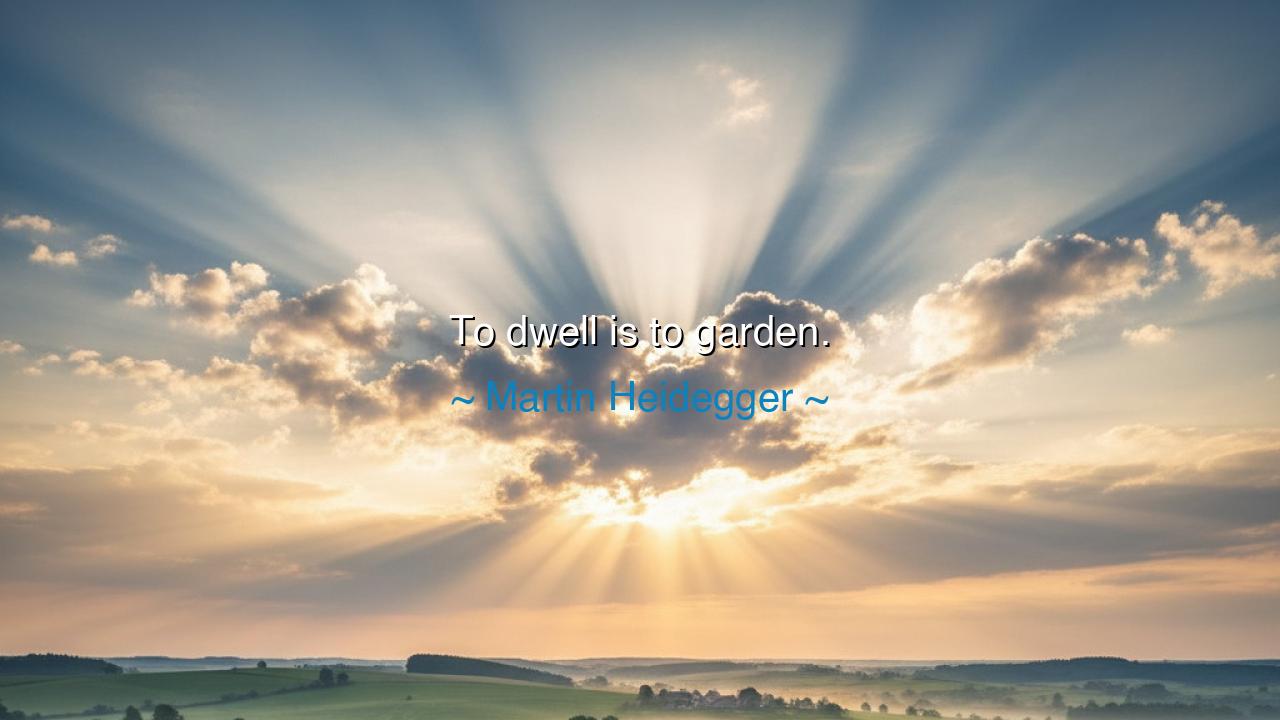
To dwell is to garden.






O Seekers of Understanding, gather closely, for the words of Martin Heidegger beckon us to contemplate the deeper meaning of our existence. “To dwell is to garden.” In these few words, Heidegger speaks not just of the act of tending to the earth, but of the very essence of being itself. To dwell—to live, to exist, to make one’s home in this world—is akin to gardening. For both acts are deeply intertwined with the earth, with the act of nurturing, and with our fundamental relationship to the world around us. To dwell is to cultivate, to tend to what is around us with care and awareness, just as the gardener tends to their soil.
In the ancient world, the act of dwelling was not merely about survival; it was about establishing a connection to the earth and the heavens. The ancient Egyptians, for example, built their homes and temples with a deep awareness of the land and its cycles. Their lives were in harmony with the Nile, whose waters they depended on for life. To dwell, for them, was not simply to live; it was to be in communion with the earth, to create a space where life could thrive. In the same way, Heidegger reminds us that dwelling is an act of creation—it is an act of gardening, where we shape the space we inhabit, where we cultivate the soil of our own lives, and where we honor the earth’s role in our growth.
Consider, too, the ancient philosopher Laozi, who spoke of the need to live in harmony with the Tao, the flow of the universe. For Laozi, to dwell in the world was to be like water, gentle yet powerful, moving in harmony with the natural order. His wisdom teaches us that to dwell is not to force or control, but to nurture and align oneself with the natural world. Just as the gardener does not force the plants to grow but creates the conditions in which they can flourish, so too must we create the right conditions for our own well-being. Gardening becomes not just an external act, but an internal one—a way of tending to our own souls, shaping our inner world so that it may grow in harmony with the larger cosmos.
In the medieval world, monks were often depicted in gardens, toiling not just in their physical labor, but in their spiritual practice. Saint Benedict wrote in his rule that the monastery should be a place of both work and prayer, where the cultivation of the garden mirrored the cultivation of the soul. The act of dwelling in the monastery was deeply intertwined with the act of tending the garden. The monks knew that their spiritual growth was reflected in the garden they maintained. To dwell in such a space was to co-create with the earth, to recognize that our growth and the earth’s growth are inseparable, and that in the act of gardening, we participate in the larger divine order of the world.
And so, O Seeker, what is the lesson for us in Heidegger’s profound words? To dwell is to garden. To live fully is to tend to the space around us, to cultivate it with care, to shape our environment as the gardener shapes their garden. Our lives, like gardens, require constant attention, awareness, and nurturing. We must not only plant seeds in the soil of our external world but also in the soil of our hearts, nurturing the growth of compassion, patience, and gratitude. Just as the gardener creates the conditions for a plant to grow, we too must create the conditions for our own flourishing. Tending to our lives with care, with mindfulness, is the essence of dwelling.
Practical steps, O Seeker, can be drawn from this wisdom. First, reflect on the space you occupy—whether it is the physical space of your home, the emotional space of your relationships, or the spiritual space of your soul. Are you cultivating it with care? Are you tending to the garden of your mind and heart with patience and love? Like the gardener, we must pull the weeds of negative thoughts, nourish the seeds of creativity and kindness, and water the plants of peace and connection. Second, recognize that dwelling does not mean a passive existence. To dwell is to act, to engage with the world in such a way that we create beauty, growth, and meaning in our lives.
Let this wisdom guide you, O Seeker: when you dwell, dwell as the gardener does—with full awareness of the cycles of life, with respect for the earth and the soul, and with the willingness to care for what is fragile and precious. In doing so, you will find that your dwelling becomes not just a place to live, but a sacred space where you and the world can grow together in harmony. For to dwell is to garden, and in that act of creation and nurturing, you will find the deepest meaning of your life.
May your garden, both in this world and in your heart, bloom with beauty, and may you always tend it with the care and love that brings forth true peace and flourishing.






AAdministratorAdministrator
Welcome, honored guests. Please leave a comment, we will respond soon